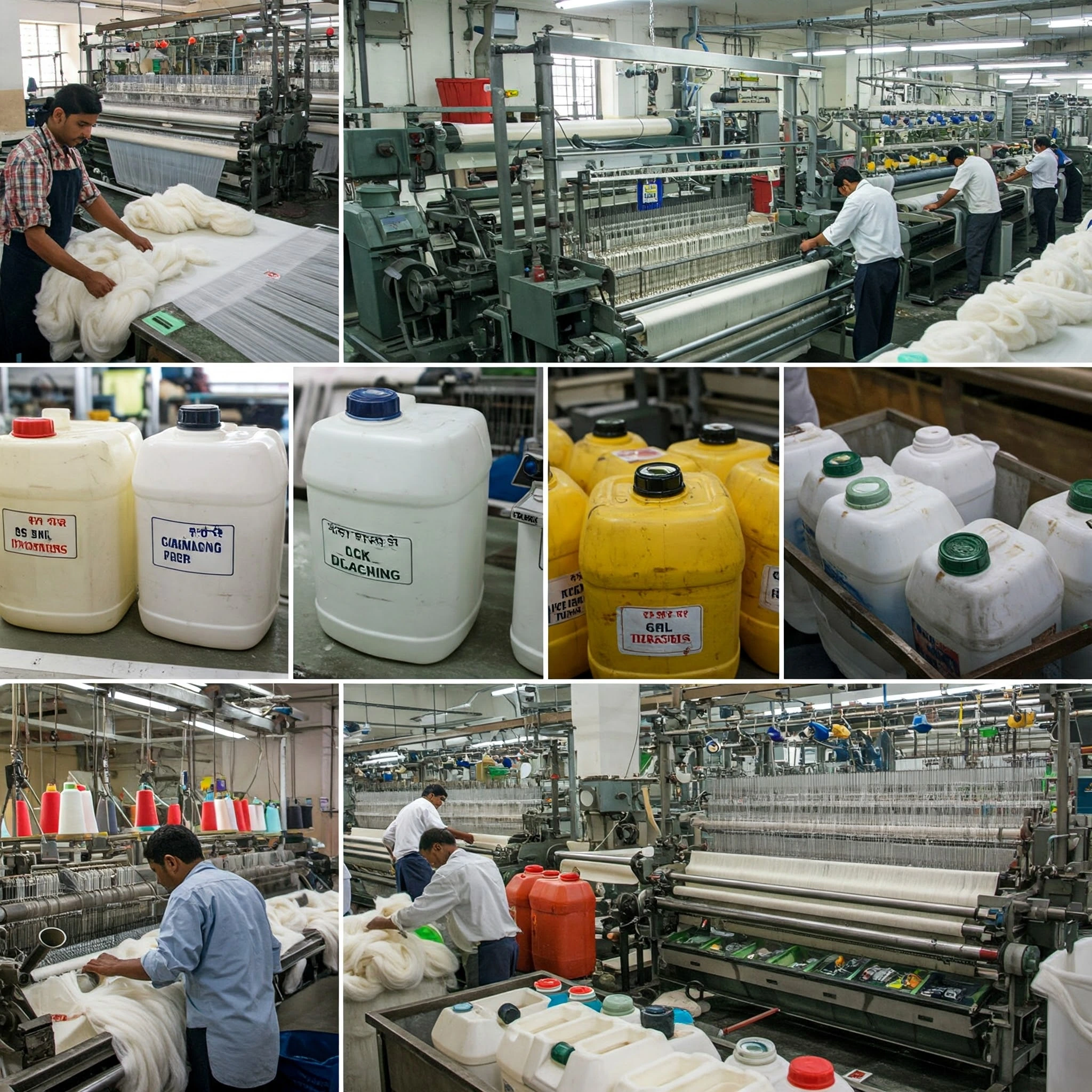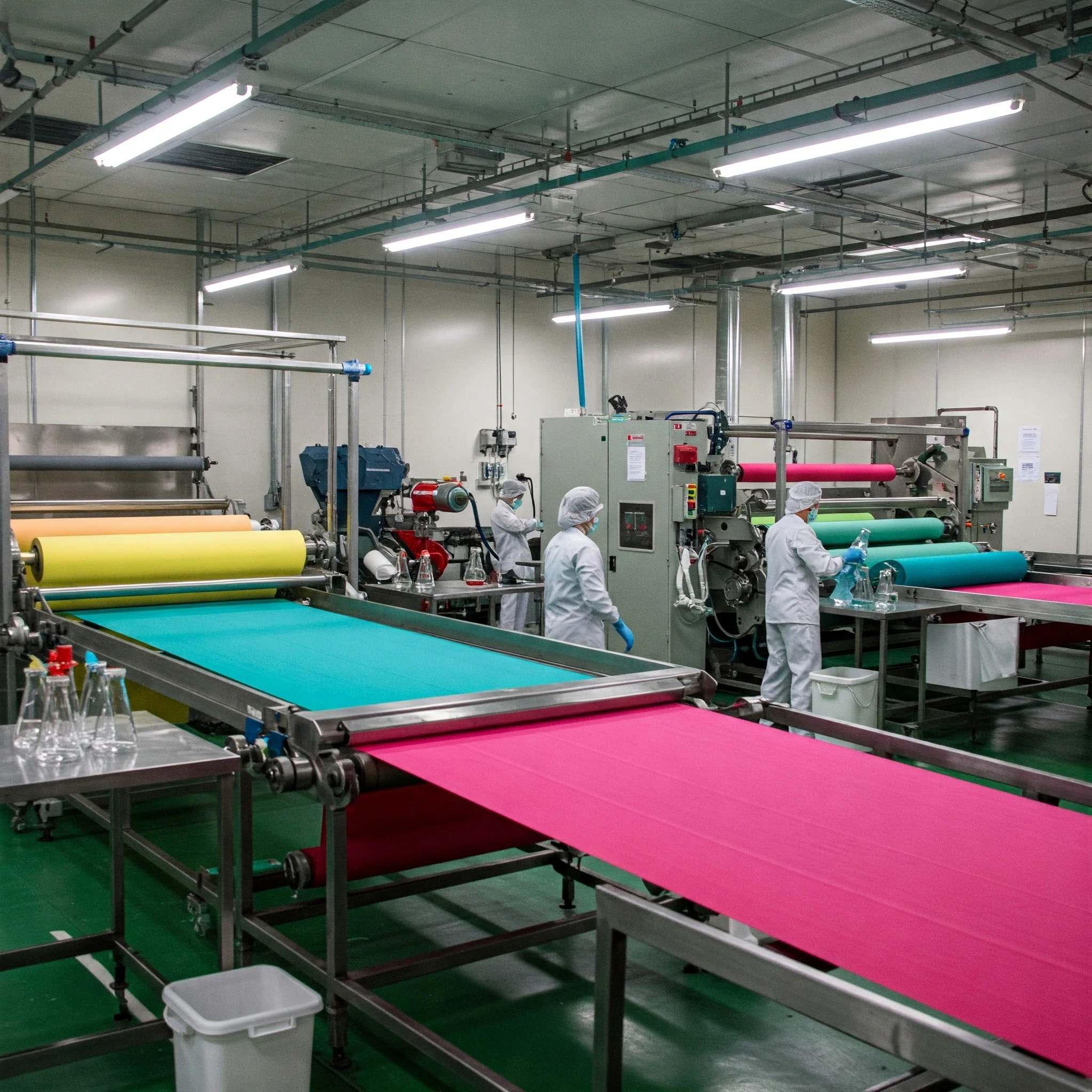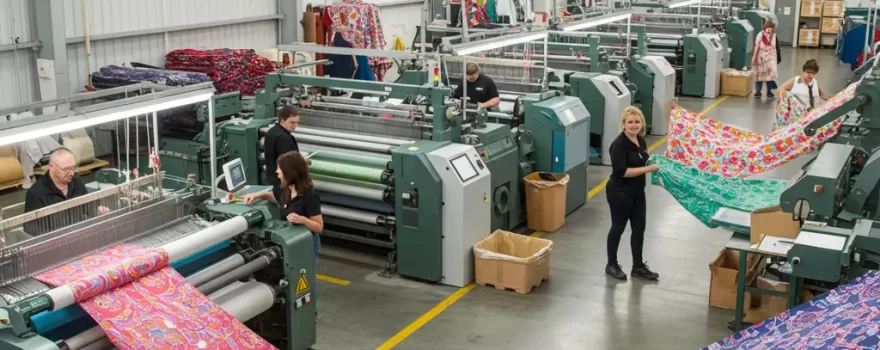
Table of Contents
Textile chemicals manufacturers UK constitutes a significant industrial segment. The market’s scale is substantial, reflecting its integral role in domestic textile production. These chemical agents extend beyond simple colorants and softeners. They include compounds that impart vital features such as resistance to flames and water. These materials include substances that provide critical characteristics like flame resistance and water repellency. The economic impact of these manufacturers is considerable, as their products are fundamental to the functionality and durability of contemporary textiles.
Key Textile Chemical Solutions
The contemporary textile manufacturing sector necessitates a sophisticated understanding of chemical applications. Beyond fundamental colorants and modifiers, advanced chemical solutions are pivotal in achieving performance and sustainability objectives.
Dyeing Agents: Innovation and Environmental Responsibility:
Traditional dyeing agents, such as reactive and disperse dyes, remain relevant. However, the industry is witnessing a transition towards sustainable alternatives. Plant-derived dyes are gaining prominence, reflecting a commitment to reduced environmental impact.
Waterless dyeing technologies, employing supercritical CO2, represent a significant advancement in minimizing water consumption.
Finishing Agents: Enhancing Functionality and Safety:
While softening and water repellency treatments are established practices, the incorporation of antimicrobial agents is increasingly essential, particularly in healthcare textiles.
Flame retardants are indispensable for safety. Nevertheless, manufacturers must prioritize alternatives that comply with stringent environmental regulations.
Auxiliaries: Optimizing Processes and Resource Efficiency:
Addressing Contemporary Industry Challenges:
Sustainability is no longer a peripheral consideration but a core imperative. Chemical manufacturers must develop solutions that support the use of recycled fibers and accommodate diverse fiber blends.
The issue of microplastic pollution demands attention. Finishing agents that mitigate fiber shedding are critical.
Chemical solutions must be developed that allow for the reduction of chemical use in the textile manufacturing process, due to rising raw material costs.
Compliance with regulatory frameworks, such as the EU Strategy for Sustainable and Circular Textiles, is essential.
Top Textile Chemicals Manufacturers UK
The UK’s textile sector benefits from a robust network of chemical suppliers. These companies provide essential products and specialized proficiency. Here’s a closer examination of key players:
| Supplier | Focus | Expertise | Key Product Areas | Value Proposition |
| Actikem | Bespoke chemical formulations | Manufacturing and repacking for UK/EU textile producers | Custom chemical solutions | Highly specific solutions, tailored to customer production processes. |
| Azelis | Integrated textile solutions | Distribution of high-grade global products | Dyes, bleaching agents, pretreatment chemicals | Wide product range, high quality products. |
| EURODYE-CTC | Global textile chemical solutions | International presence, premium products and processes | Comprehensive textile chemical solutions | Global reach, high-quality products and processes. |
| Huntsman Corporation | Specialty chemical manufacturing | Innovative solutions for performance and sustainability | Performance enhancing and sustainable chemicals | Innovation, sustainability. |
| Sarex | Textile auxiliary chemicals | International distribution of premium-grade auxiliaries | Textile auxiliaries | Wide global reach, high quality products. |
| Monarch Chemicals UK | Chemical manufacturing and distribution | Wide range of chemical solutions | Wide range of chemical solutions | Wide range of products. |
These suppliers are more than mere distributors. They are partners in the textile production process. Their expertise extends beyond product delivery to encompass technical support and process optimization. Selecting the right supplier is crucial, directly impacting product quality and manufacturing efficiency.
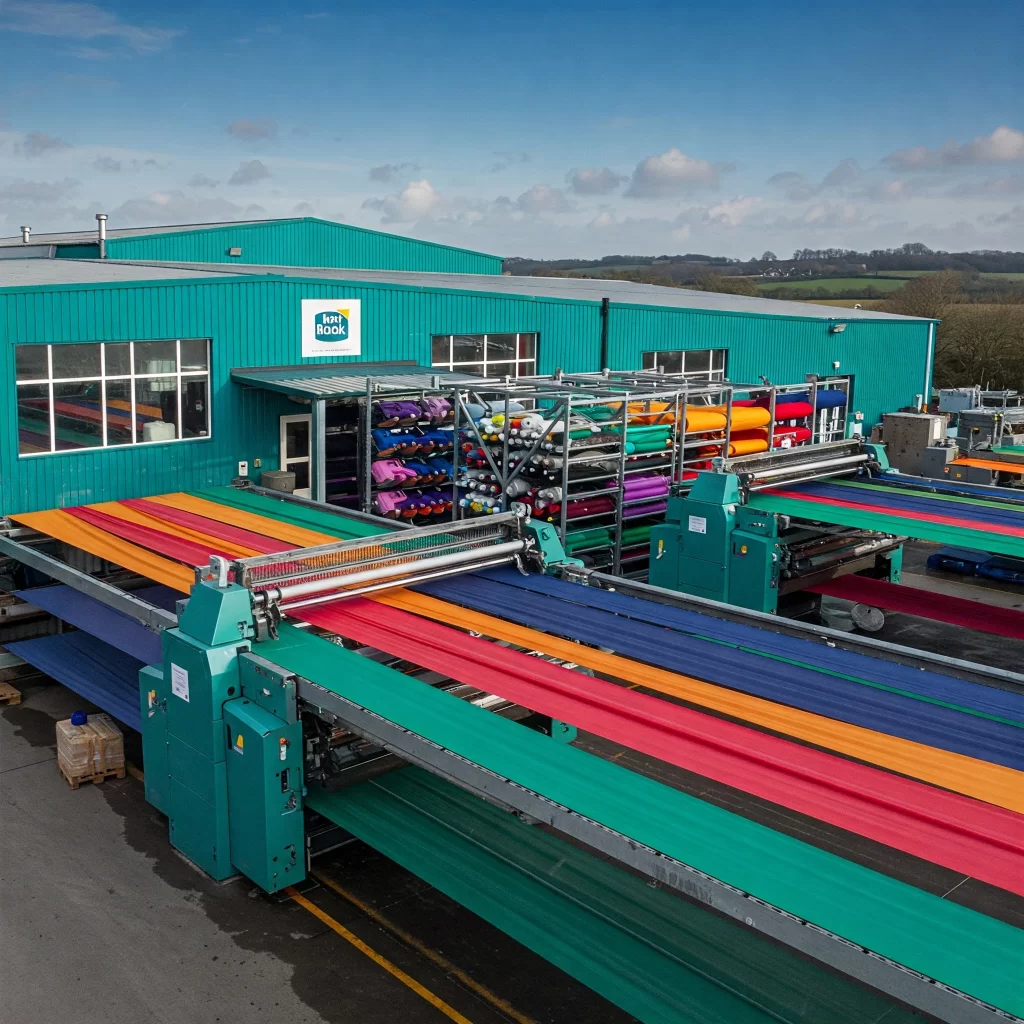
Regulatory Standards for Textile Chemicals
The textile chemical industry in the UK functions under a set of stringent regulatory standards. Following these standards is not merely a choice; it is a requirement dictated by law and ethical considerations.
UK REACH: A Foundation for Safety:
The cornerstone of chemical regulation is UK REACH. This mirrors the EU’s REACH, ensuring chemical safety.
It mandates that all chemicals used in textiles undergo thorough risk assessment. This includes those used in manufacturing.
Manufacturers and importers must register chemicals, demonstrating their safety.
This protects both human health and the environment.
Environmental Standards: Beyond Compliance:
Beyond REACH, environmental standards are paramount. These address water pollution and waste management.
Sustainable practices are no longer a niche concern. They are a necessity.
The reduction of harmful chemical discharge into water systems is a major concern.
The reduction of micro plastics being released into the environment is also a large concern.
Sustainable Practices: A Competitive Advantage:
Adopting sustainable practices is not just about compliance. It’s about long-term viability.
Consumers demand eco-friendly products. This creates market opportunities.
Using plant based dyes, and CO2 dying systems, gives company’s a leading edge in the market.
Companies that produce textile chemicals that help to reduce micro plastic pollution, will also have a competitive edge.
The regulatory landscape is complex. However, it is essential for responsible textile manufacturing. By prioritizing compliance and sustainable practices, the UK textile industry can thrive in a competitive global market.
Eco-Friendly Textile Chemicals
The UK textile industry is undergoing a significant transformation. The focus is shifting towards sustainable practices and eco-conscious solutions. We are moving beyond mere compliance; we are embracing circularity.
Sustainable Materials & Fibers: A Foundation for Green Textiles:
Renewable Resources: The industry is prioritizing materials derived from renewable sources. These include organic cotton, hemp, bamboo, and Tencel.
Biodegradable Options: Materials that decompose naturally are gaining prominence. Bamboo, soy, and banana-based fibers exemplify this trend.
Recycled Materials: The utilization of recycled materials, such as recycled plastic bottles for polyester production, is growing. Circulose, a pulp from recycled cotton, is also a good example.
Tencel: This fabric, produced from dissolved wood pulp, demonstrates a commitment to reduced water consumption and solvent recycling.
Innovative Textile Processes: Minimizing Environmental Impact:
Waterless Dyeing: Technologies that reduce or eliminate water usage in dyeing processes are being developed.
Recycrom: This line of powder dyes, derived from recycled textile waste, represents a significant advancement.
Enzymes: The use of enzymes in textile processing for applications such as denim fading, desizing, and scouring is becoming more common.
Hybrid Pigments: The use of dye chemically connected to a polymer particle is a new innovation.
Biological Dyeing: The use of natural sources to create dyes, is an area of growing interest.
Key Companies and Initiatives: Driving Sustainable Change:
SWEET: Researchers at the University of Southampton and UWE Bristol have developed sustainable, biodegradable e-textiles.
ERCA TCS: This Company is recognized for its dedication to sustainable textile chemistry and circularity.
The Dow Chemical Company: Their ECOFAST Pure Sustainable Textile Treatment facilitates brighter colors on natural textiles while improving resource efficiency.
Ecofoot: This Company is a leading innovator in sustainable dyeing, with a focus on hybrid pigments.
Officina+39: A trailblazer in sustainable dyeing solutions, known for their Recycrom technology.
These developments are not merely trends. They are indicative of a fundamental shift in the UK textile industry. By embracing these sustainable solutions, the industry can ensure its long-term viability and contribute to a more environmentally responsible future.
How to Select a Premier Textile Chemical Manufacturer in the UK: A Strategic Approach
The selection of a textile chemical manufacturer is a strategic decision. The textile industry in the UK is experiencing a major transformation, with an increasing emphasis on sustainable practices and environmentally friendly solutions.
Experience and Expertise: A Foundation of Reliability:
Technical Capabilities: Assess their capacity to develop and produce specialized, or custom chemical solutions.
Industry Longevity: Prioritize manufacturers with a proven track record. This indicates stability and industry knowledge.
Specific Expertise: Verify their proficiency in your specific chemical requirements. Dyes, finishes, or auxiliaries each demand specialized knowledge.
Quality and Certifications: Ensuring Excellence:
Sustainability Certifications: Oeko-Tex, GOTS, and Bluesign certifications indicate commitment to environmentally sound practices.
Quality Control: Scrutinize their quality control processes. This includes raw material sourcing and final product testing.
Certifications: Look for ISO 9001 (quality management) and GMP (Good Manufacturing Practice) certifications.
Sustainability and Environmental Impact: Responsible Practices:
Life Cycle Assessment: Evaluate their methodology regarding the complete product lifecycle, encompassing everything from sourcing to disposal.
Eco-Friendly Practices: Evaluate their commitment to minimizing environmental impact through sustainable manufacturing and waste management.
REACH Compliance: Ensure strict adherence to REACH regulations. This is a legal necessity.
Customer Reviews and References: Gauging Satisfaction:
Online Reputation: Research online presence for any negative feedback.
Testimonials: Seek references to assess customer satisfaction.
Financial Stability and Reliability: Long-Term Partnership:
Communication: Evaluate responsiveness and transparency.
Company History: Research their financial stability for long-term reliability.
Other Factors: Tailoring to Your Needs:
Location: Consider location for shipping and delivery times.
Product Range: Ensure they offer the required chemicals.
Customization: Determine their ability to provide custom solutions.
Pricing: Compare pricing for competitive rates.
By employing this strategic approach, you can select a textile chemical manufacturer that meets your specific needs, while also upholding safety and sustainability standards.
Where to Procure Reliable Textile Chemicals in the UK: Direct Engagement and Due Diligence
Sourcing reliable textile chemicals necessitates direct engagement with established suppliers. The UK market offers a range of experienced manufacturers and distributors. We encourage direct contact and sample requests to ensure product suitability.
Sourcing reliable textile chemicals necessitates direct engagement with established suppliers. The UK market offers a range of experienced manufacturers and distributors. We encourage direct contact and sample requests to ensure product suitability.
Established UK Suppliers:
Monarch Chemicals:
Offers a broad spectrum of chemicals for the leather and textile industries.
Demonstrates over 30 years of industry experience.
Provides flexible delivery and REACH-registered sodium sulfide flake.
ReAgent Chemical Services:
Specializes in textile coatings manufacturing.
Offers nearly 50 years of experience.
Handles aqueous polyurethane dispersions across various viscosities.
Provides comprehensive service, from technical consultation to supply chain management.
Wego Chemical Group:
Functions as a global importer, supplier, and distributor of textile auxiliary chemicals.
Maintains long-standing partnerships with textile auxiliaries manufacturers.
Other Notable Global Suppliers:
Beyond UK-based suppliers, it is also worth noting that Turkey has a strong and active Textile chemical manufacturing industry. For those exploring international sourcing options, you may find valuable information regarding [ https://biopolchemicals.com/uncategorized/textile-chemicals-manufacturers-in-turkey/ ]
Archroma: A global leader in innovative and sustainable textile chemical solutions.
Huntsman Corporation: A global manufacturer of differentiated specialty chemicals, with a strong textile presence.
Evonik Industries: A specialty chemicals company focused on sustainable textile solutions.
Kiri Industries: Known for innovative products and sustainable practices across textiles, paper, and leather.
TANATEX Chemicals bv: Focused on sustainable development within the textile sector.
Sarex Chemicals (India): A large textile auxiliaries manufacturer with international distribution.
Rudolf GmbH: Specializes in sustainable solutions for the textile industry.
Solvay SA: A global chemical company with sustainable textile solutions.
The Lubrizol Corporation: A global chemical company with sustainable textile solutions.
Wacker Chemie AG: A global chemical company with sustainable textile solutions.
OMNOVA Solutions: A global chemical company with sustainable textile solutions.
Pure Chemicals: A company focused on sustainable textile solutions.
RAJDHANI Chemicals: A company focused on sustainable textile solutions.
We advise readers to:
Research the sustainability initiatives of each organization.
Explore the product ranges and technical capabilities of these suppliers.
Request samples to analyze the quality and consistency of the product.
Participate in direct discussions to clarify specific requirements.
Direct engagement with these suppliers will facilitate informed decision-making and ensure the procurement of reliable textile chemicals.
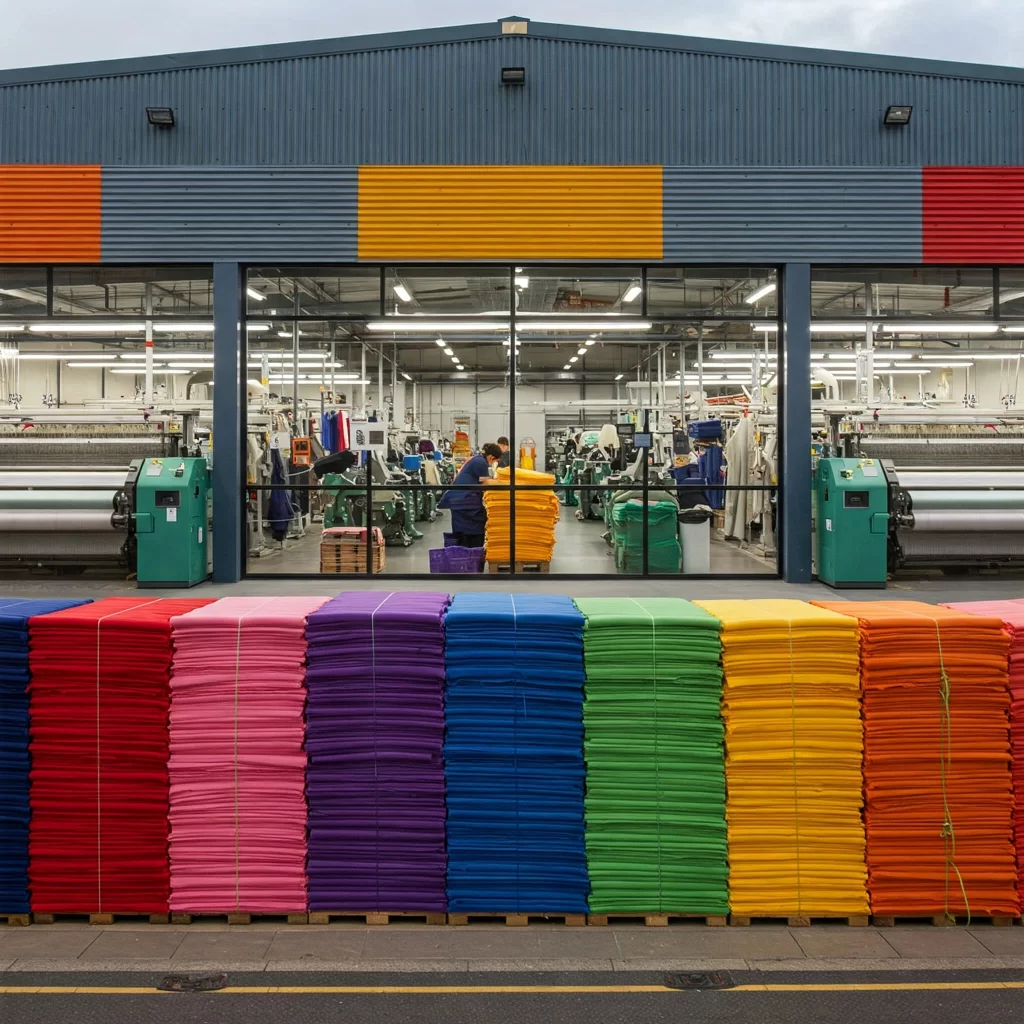
The Future of the Textile Chemicals Industry in the UK: Navigating Innovation and Sustainability
The UK’s textile chemicals industry, while facing formidable challenges, is poised for growth. This growth will be propelled by a confluence of factors, including the imperative for sustainable practices, the burgeoning demand for technical textile applications, and the influence of rising global disposable incomes. A relentless focus on innovation and the production of high-quality goods will be paramount.
Key Trends and Drivers:
| Trend | Description |
| Sustainability | The industry’s trajectory is set towards eco-friendly solutions, with biodegradable and non-toxic chemical formulations. |
| Technical Textiles | Rising demand for specialized chemicals in automotive, healthcare, and construction sectors. |
| Innovation | Digital printing and advanced manufacturing techniques are driving the need for specialized chemical solutions. |
| Rising Disposable Incomes | Increasing incomes in emerging economies are boosting demand for premium apparel and advanced textile chemicals. |
| Quality and Durability | Consumers prioritize durable, low-maintenance, and multifunctional fabrics, fostering innovation in textile chemicals. |
| Global Supply Chains | The interconnected nature of global textile supply chains significantly influences market growth. |
| Antimicrobial Treatments | Hygiene and health concerns are driving demand for antimicrobial textile treatments. |
| Digital Printing | Development of textile chemicals optimized for digital printing is a key focus area. |
| Circular Fashion Initiatives | Adoption of textile chemicals supporting circular fashion practices is gaining momentum. |
| Specialty Chemicals | Introduction of specialty chemicals tailored for technical textiles is a notable industry trend. |
Challenges:
| Challenge | Description |
| Environmental Concerns | The industry must reduce its environmental footprint by cutting emissions, minimizing water use, and eliminating hazardous chemicals. |
| Strict Regulations | Compliance with stringent chemical and specialty chemical regulations poses a significant challenge. |
| Raw Material Shortages & Price Increases | Volatility in raw material supply and labor shortages lead to fluctuating prices, impacting production. |
| Decline in Manufacturing | The shift away from traditional manufacturing in the UK presents a challenge for domestic textile production. |
In essence, the future of the UK textile chemicals industry hinges on its ability to embrace innovation, prioritize sustainability, and adapt to the evolving demands of a global market.
